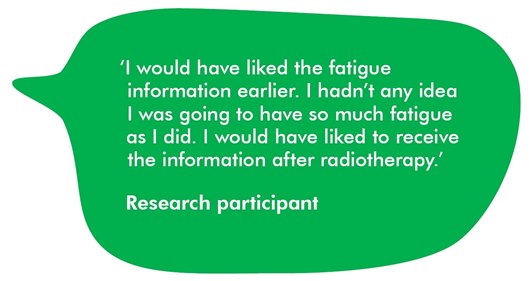In this blog, our intern Liza talks about getting information at the right time, when you really need it. She also asks you to share your experience of getting information after a diagnosis.
During your cancer diagnosis, did you have all the information about coping with cancer that you needed? Our Evaluation team found that many people were only given clinical information at diagnosis stage. This information is crucial and we want to make sure you’re getting it. But we also want to make sure you’re getting our other important information – information about living and coping with the impact of cancer.

Tell us in a comment below about your experience of getting information after a diagnosis. Did you get the information you needed? Was anything given too soon or too late? Did you get information about living with cancer? Where from?
As part of our work in the Cancer Information Development team, we get feedback from people affected by cancer and use it to improve our information. In our research and evaluation, many of you told us that you wished you’d had more information about coping with cancer earlier.
We also found that many people were unaware of just how much information Macmillan can provide about living and coping with cancer. We want to improve this! We want to raise the profile of our ‘living with cancer’ information, and we need your help. We're asking you to share your knowledge of this type of information, and to tell us about your experience with it.
So, what are some of our top resources of this type?
1. The cancer guide
2. Coping with fatigue
3. The toilet card
4. Help with the cost of cancer
5. Healthy eating and cancer
If these topics are new to you, or you know someone who might not have received them but would benefit from seeing them – please spread the word. They are just a small selection from a range of coping information that could be useful to you or someone you know.
In particular, research showed us that our fatigue information was often received too late. People affected by cancer reported getting the information when they were already struggling with fatigue. What we want is for this information to reach people earlier, so they know what to expect and how to cope.
And there are many more examples of where our information needs to reach people as early as possible. You don’t want to run into money problems before getting information about help with the cost of cancer that could have really helped. You don’t want your well-being to deteriorate before you search for a guide to healthy eating and cancer. And you don’t want a problematic toilet situation to happen before someone tells you about the Macmillan toilet card.
Hopefully this blog shows you the range of information available. And by sharing it we can get more people the information they need and want, at the right time for them.
Last year, 26,995 booklets were ordered from us by people affected by cancer. This is great, but we want to improve the accessibility and awareness of the range of booklets available.
Please comment below and tell us about your experience with receiving information about coping with cancer. Did you receive this type of information? If so - how, and when? What helpful changes can we make at Macmillan to improve your experience?
Thanks, as always, for your feedback and support.
To see what else Macmillan's cancer information team has been blogging about, please visit our blog home page! You can subscribe to receive our blogs by email or RSS too.
We're with you every step of the way
The Macmillan team is here to help. Our cancer support specialists can answer your questions, offer support, or simply listen if you need a chat. Call us free on 0808 808 00 00.
Comments? Feel free to add them below (you need to be logged in).
Keep in touch Follow Macmillan’s cancer information team on Twitter @mac_cancerinfo
Whatever cancer throws your way, we’re right there with you.
We’re here to provide physical, financial and emotional support.
© Macmillan Cancer Support 2026 © Macmillan Cancer Support, registered charity in England and Wales (261017), Scotland (SC039907) and the Isle of Man (604). Also operating in Northern Ireland. A company limited by guarantee, registered in England and Wales company number 2400969. Isle of Man company number 4694F. Registered office: 3rd Floor, Bronze Building, The Forge, 105 Sumner Street, London, SE1 9HZ. VAT no: 668265007